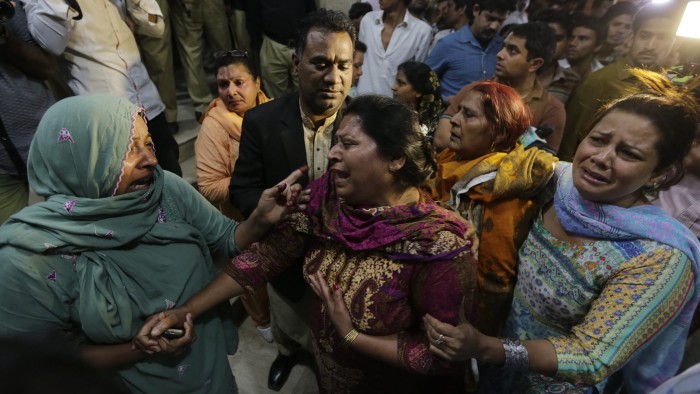Easter carnage in a park delivers Pakistan’s fatal diagnosis

Roula Khalaf, Editor of the FT, selects her favourite stories in this weekly newsletter.
Lahore is the birthplace of Pakistan. It is where, on March 23 1940, the Muslim League called for the creation of a homeland for Muslims. In their euphoria as they wrote the Lahore Resolution, the statesmen who dreamt of Pakistan included a stipulation that “adequate, effective and mandatory safeguards shall be specifically provided in the constitution for minorities . . . for the protection of their religious, cultural, economic, political, administrative and other rights”.
But those statesmen who imagined Pakistan have bequeathed it continually poor successors.
On Sunday, more than 70 Pakistanis were murdered in Lahore’s Gulshan-i- Iqbal Park in a suicide bombing targeting Christians celebrating Easter. Most of the dead were women and children. Newly wed couples were slain, families were decimated and more than 300 innocents have been injured.
All night, residents of Lahore rushed to give blood for the wounded. In a society fractured along religious and sectarian lines, no one thought of the purity of his or her blood. Some years ago, I met Sadiq Daniel, the bishop of Karachi. “I always fight for my country,” he told me. “There’s no such thing as minorities, we are all Pakistani.”
In the 15 years since the war on terror brought death and bloodshed to our doors on an unimaginable scale, pundits have been quick to categorise Pakistan as a failed state. Yet those Pakistanis who live here and who love the country, who remember some fragment of that long-ago dream, passed down to us by earlier generations, have long defended our home against such a fatal prognosis. But, as we commence a week of burials, laying in the earth the bloodied youth of this country, the statement rings true.
Pakistan has surrendered itself to the idea that it can support militant outfits operating outside its borders while deploring them at home. It is this deceit that has rendered us a shadow country, one ruled over by murky powers who speak in tongues, waging ghost wars. It is this deceit that is responsible for our cycle of butchery.
Pakistan can no longer convince its people that it has the means or the will to protect them. When armed men slaughtered 132 children at the Army Public School in Peshawar in 2014, it became clear that the Pakistani state had lost its monopoly on violence.
The state had long ago abdicated its role in providing education, health, and basic amenities to its people. Schools and hospitals are run by charities, the ideologically driven or wealthy individuals. Law and order and justice, phantoms in modern Pakistan, were easily claimed by groups such as the Taliban and their factions who policed villages, settled disputes and meted harsh punishments in place of Pakistan’s sluggish and corrupt courts.
Finally, the state has renounced its primacy in fostering an inclusive, compassionate body politic. The inheritors of that power, the power to imagine Pakistan, are empathetically illiterate, impoverished men whose value has long been cancelled out by their country, which secured for them neither jobs nor prospects. They have been condemned to this role by a country that offered no options. And with violence — the only power anyone has left in Pakistan — they will decide who will live and who will die.
How can one explain to those who sent a suicide bomber into the park on Easter Sunday, that Mary, the mother of Christ, is mentioned more times in the Koran than in the New Testament — 34 to the older book’s 19? How can one remind them that Mary is the only woman to be named in Islam’s holy book? Who should have taught them Surah 3.42 of God’s message to his followers in Islam? “And remember when the angels said: O Maryam, behold Allah has chosen you, purified you, and chosen you above the women of the world.” How, then, can any man kill her sons?
The writer is author of ‘The Shadow of The Crescent Moon’
Comments